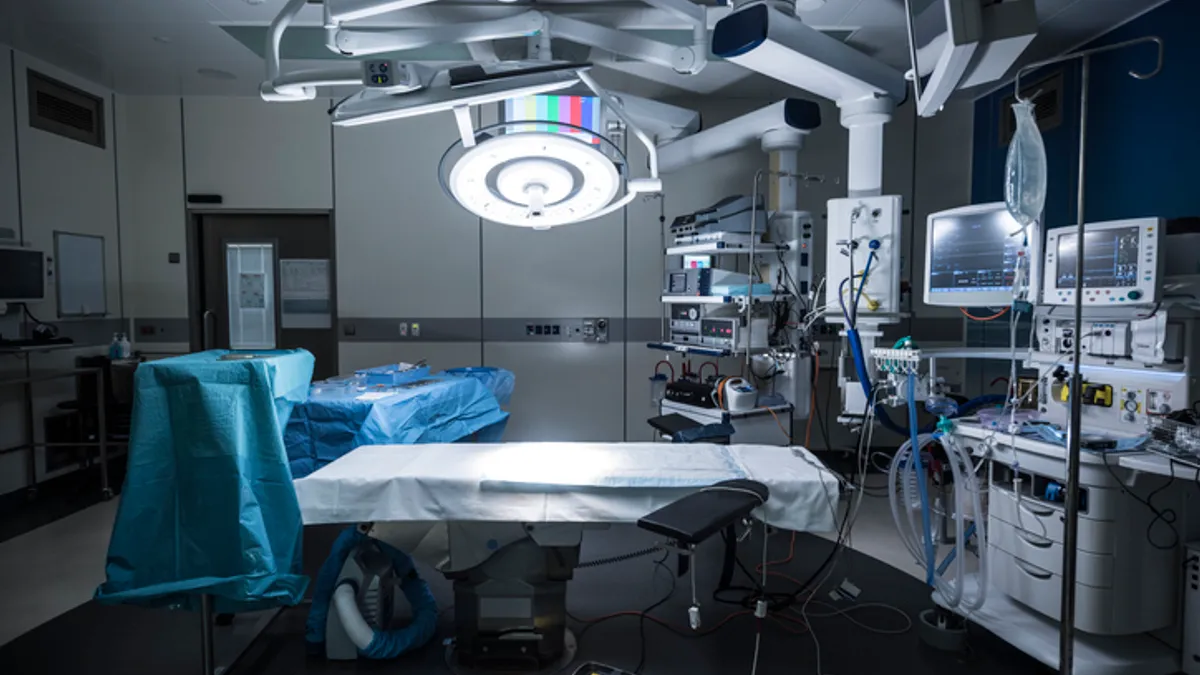Dive Brief:
- Moody's Investors Service has called out healthcare staffing shortages and supply chain disruptions as two factors that could continue to affect medical device companies into 2022. While shortages of components and elevated shipping costs are expected to be "manageable," hospital capacity constraints could impact procedure-dependent medtechs, according to the Jan. 31 quarterly report.
- Demand for COVID-19 testing has remained elevated for longer than expected, but it's not anticipated to continue at current levels. Still, Moody's expects that rapid at-home tests could provide ongoing revenue for some diagnostics companies, even if at lower levels in the future.
- Medtech companies are expecting another busy year for mergers and acquisitions, though Moody's is forecasting fewer "mega deals." In their most recent earnings calls, Johnson & Johnson and Becton Dickinson referred to smaller tuck-in deals when talking about future acquisitions.
Dive Insight:
Hospital staffing shortages were top-of-mind for medtech companies going into 2022. During the height of the surge in January, nearly a quarter of U.S. hospitals reported critical staffing shortages, according to HHS data.
The staffing challenges are expected to linger, according to Moody's latest quarterly report. This could especially affect device makers in the orthopaedics sector, such as Stryker and Zimmer Biomet. Both companies said in recent earnings calls that staffing shortages contributed to lower procedure volumes, as either hospital staff were exposed to COVID-19 or patients themselves were sick. However, demand for surgical robots remained strong.
As the current surge of omicron cases subsides, and vaccination efforts continue, Moody's expects to see revenues expand due to pent-up demand for deferred procedures. However, if the current variant or a new variant remains widespread, that could change.
While the latest COVID-19 wave has hit procedure-reliant medtechs, diagnostics companies saw an unexpected surge in demand. It's anyone's guess as to whether that will continue. Although testing demand is not expected to remain at current levels, Moody's noted that at-home testing could continue to provide ongoing revenue for some companies.
"As the usage of rapid at-home diagnostic tests gains acceptance, we believe such tests, whether for the coronavirus or other types of diseases, like the flu, will likely become a more permanent feature of the healthcare landscape," Moody's wrote in the report.
Medtechs also are contending with continued supply chain disruptions going into 2022. Although Moody's said the disruptions should be "manageable," companies are working through shortages of semiconductors and other materials, as well as rising shipping costs.
GE Healthcare said it expects supply chain disruptions to continue through at least the first half of 2022, and Hologic said it anticipates deferring $200 million in revenue in 2022 as shortages of equipment affect shipments of its mammography and imaging devices. Other companies, such as Intuitive Surgical, acknowledged that supply shortages had affected shipments, but not enough to be material to their business.
AdvaMed responded to a report last month from the Department of Commerce, which found the median inventory held by chips consumers, including medical device manufacturers, has fallen from 40 days in 2019 to less than 5 days in 2021. The medtech lobby continues to call for medical device companies to be prioritized for semiconductors over automotive and industrial companies, which use similar types of chips.
Finally, Moody's touched briefly on mergers and acquisitions, expecting another active year after 2021's record numbers. Although fewer "mega deals" are expected for 2022, valuations are starting to come down, making for more potential targets.
Analysts with BTIG are watching digital therapeutics, transcatheter mitral and tricuspid valve repair devices, adjustable intra-ocular lenses, and refractive surgery solutions as potential sectors for acquisitions.
In a Feb. 4 note, the analysts wrote that smaller acquisitions have been "an effective strategy for a number of companies (and not necessarily new), but it seems that more have come to the realization that the tuck-in strategy is the best way to ensure a more constant growth cadence is achieved."
J&J and BD both indicated in earnings calls that they plan to be acquisitive in 2022, with more of a focus on earlier-stage companies and moderately-priced deals.














